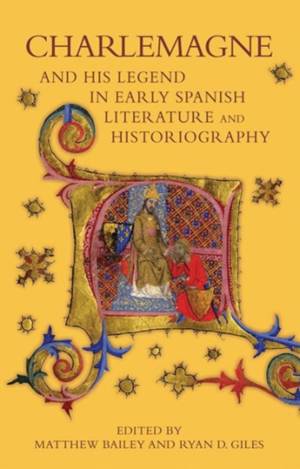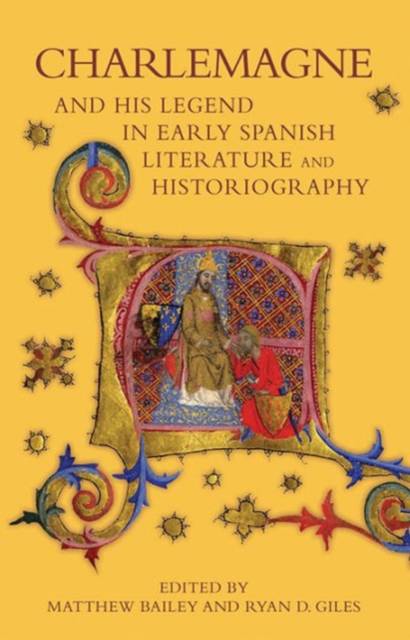
Je cadeautjes zeker op tijd in huis hebben voor de feestdagen? Kom langs in onze winkels en vind het perfecte geschenk!
- Afhalen na 1 uur in een winkel met voorraad
- Gratis thuislevering in België vanaf € 30
- Ruim aanbod met 7 miljoen producten
Je cadeautjes zeker op tijd in huis hebben voor de feestdagen? Kom langs in onze winkels en vind het perfecte geschenk!
- Afhalen na 1 uur in een winkel met voorraad
- Gratis thuislevering in België vanaf € 30
- Ruim aanbod met 7 miljoen producten
Zoeken
Charlemagne and His Legend in Early Spanish Literature and Historiography
€ 177,45
+ 354 punten
Omschrijving
New examinations of the figure of Charlemagne in Spanish literature and culture. The historical point of departure for this volume is Charlemagne's ill-fated incursion into Spain in 778. After an unsuccessful siege of Zaragoza, the king of the Franks directed his army north and on his passage through the Pyrenees, he turned his wrath on Pamplona, destroying the Basque city and its walls. The Basques subsequently ambushed the rearguard of Charlemagne's army on the heights of Pyrenees, killing numerous officers of the palace, plunderingthe baggage, and then vanishing into the forested hills, leaving the Franks to grieve without the satisfaction of revenge. In Spain, popular narratives eventually diverted their attention away from the Franks to the Spaniards responsible for their slaughter.
This volume explores those legendary narratives of the Spaniards who defeated Charlemagne's army and the larger textual and cultural context of his presence in Spain, from before their careful elaboration in Latin and vernacular chronicles into the early modern period. It shares with previous studies a focus on the narration of historical and imaginary events across genres, but is unique in its emphasis on the reception and evolution of the legendary figure of Charlemagne in Spain. Overall, its purpose is to address the diversity and importance of the Carolingian legends in the literary, historical, and imaginative spheres during the Middle Ages, Renaissance, and into the seventeenth century. Matthew Bailey is Professor of Spanish at Washington and Lee University in Lexington, Virginia; Ryan D. Giles is Associate Professor in the Department of Spanish and Portuguese at Indiana University, Bloomington. Contributors: Frederick A. de Armas, Matthew Bailey, Anibal Biglieri, Ryan D. Giles, Lucy K. Pick, Mercedes Vaquero.
This volume explores those legendary narratives of the Spaniards who defeated Charlemagne's army and the larger textual and cultural context of his presence in Spain, from before their careful elaboration in Latin and vernacular chronicles into the early modern period. It shares with previous studies a focus on the narration of historical and imaginary events across genres, but is unique in its emphasis on the reception and evolution of the legendary figure of Charlemagne in Spain. Overall, its purpose is to address the diversity and importance of the Carolingian legends in the literary, historical, and imaginative spheres during the Middle Ages, Renaissance, and into the seventeenth century. Matthew Bailey is Professor of Spanish at Washington and Lee University in Lexington, Virginia; Ryan D. Giles is Associate Professor in the Department of Spanish and Portuguese at Indiana University, Bloomington. Contributors: Frederick A. de Armas, Matthew Bailey, Anibal Biglieri, Ryan D. Giles, Lucy K. Pick, Mercedes Vaquero.
Specificaties
Betrokkenen
- Uitgeverij:
Inhoud
- Aantal bladzijden:
- 216
- Taal:
- Engels
- Reeks:
- Reeksnummer:
- nr. 6
Eigenschappen
- Productcode (EAN):
- 9781843844204
- Verschijningsdatum:
- 19/08/2016
- Uitvoering:
- Hardcover
- Formaat:
- Genaaid
- Afmetingen:
- 140 mm x 216 mm
- Gewicht:
- 399 g

Alleen bij Standaard Boekhandel
+ 354 punten op je klantenkaart van Standaard Boekhandel
Beoordelingen
We publiceren alleen reviews die voldoen aan de voorwaarden voor reviews. Bekijk onze voorwaarden voor reviews.








